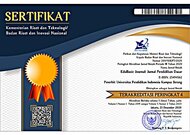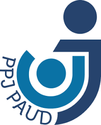Analysis of Logical Thinking Ability in Natural Science Learning Using Blended Learning Based on Google Classroom
Abstract
The ability to use technology during the COVID-19 pandemic is needed to empower logical thinking ability as one of the 21st-century competencies. This study aims to analyze the effect of learning natural science assisted by google classroom on improving students' logical thinking abilities during COVID-19. The use of Google Classroom potentially facilitates educators to create creative, innovative, and collaborative blended learning to still build classroom interactions in social distancing period. This quasi-experimental research employed a pre-experimental one-group pretest-posttest design. The research subjects were 39 sixth-grade students. The validity and reliability of the data on the ability to think logically used a logical thinking ability instrument tested. The data analysis utilized the N-gain test with the help of SPSS 21. The results revealed that the N-gain was 82.43 or 82.4%, with a minimum N-gain score of 53.3% and a maximum of 83.5%, included in the high category (g) ≥ 0.7. Thus, it could be concluded that natural science learning assisted by Google Classroom media significantly affected students' logical thinking abilities. Educators can use the analysis results to evaluate natural science learning, especially in elementary schools, to encourage the quality of students' logical thinking abilities.
Keywords
Full Text:
PDFReferences
Afandi, A., Sajidan, S., Akhyar, M., & Suryani, N. (2018). Pre-service science teachers' perception about high order thinking skills (HOTS) in the 21st century. Journal of Pedagogy and Teacher Education, 2(1), 107–114.
Azhar, K. A., & Iqbal, N. (2018). Effectiveness of Google Classroom: Teachers’ perceptions. Prizren Social Science Journal, 2(2), 52–66.
Fadiana, M., Amin, S. M., Lukito, A., Wardhono, A., & Aishah, S. (2019). Assessment of seventh grade students capacity of logical thinking. Jurnal Pendidikan IPA Indonesia, 8(1), 75–80.
Gunawan, G., Suranti, N. M. Y., & Fathoroni, F. (2020). Variations of models and learning platforms for prospective teachers during the covid-19 pandemic period. Indonesian Journal of Teacher Education, 1(2), 61–70.
Hake, R. R. (2002). Relationship of individual student normalized learning gains in mechanics with gender, high-school physics, and pretest scores on mathematics and spatial visualization. The Physics Education Research Conference, dated 7-8 August 2002, (pp. 1–14). Boise, Idaho: PERC.
Lierde, V. V., Kalpakian, J., & Jarid, N. E. (2013). Students’ logical thinking and teaching efficiency: A Moroccan case. The African Symposium, 13(2), 52–60.
Mulenga, E. M., & Marbán, J. M. (2020). Is covid-19 the gateway for digital learning in mathematics education? Contemporary Educational Technology, 12(2), 1–11.
Murtikusuma, R. P., Hobri, H., Fatahillah, A., Hussen, S., Prasetyo, R. R., & Alfarisi, M. A. (2019). Development of blended learning based on Google Classroom with Osing culture theme in mathematics learning. Journal of Physics: Conference Series, 1165 (012017), 1–8.
Nihayah, A. Z., Fakhriyah, F., & Fardhani, M. A. (2019). Model pembelajaran CTL berbantuan media pop-up book untuk meningkatkan kemampuan berpikir kreatif siswa SD. EduBasic Journal: Jurnal Pendidikan Dasar, 1(2), 90–99.
NSTA. (2013). Next generation science: Learning, literacy, and living. NSTA 61st National Conference on Science Education, dated 11–14 April 2013 (pp. 10-15). San Antonio, Texas: National Science Teachers Association.
Pamungkas, A. S., & Setiani, Y. (2017). Peranan pengetahuan awal dan self esteem matematis terhadap kemampuan berpikir logis mahasiswa, Kreano: Jurnal Matemataika Kreatif Inovatif, 8(1), 61–68.
Pappas, C. (2015). Blended learning advantages and disadvantages in corporate training. eLearning Industry, dated 13 October 2015.
Perienen, A. (2020). Frameworks for ICT integration in mathematics education - a teacher’s perspective. Eurasia Journal of Mathematics, Science and Technology Education, 16(6), 1–12.
Papadopoulos, I., Kogias, D., Patrikakis, C. Z., & Marinou, C. (2017). Enhancing the student’s logical thinking with Gherkin language. 2017 IEEE Global Engineering Education Conference (EDUCON), dated 28 April 2017, (pp. 1543–1547). Athens, Greece: IEEE.
Putra, P., Liriwati, F. Y., Tahrim, T., Syafrudin, S., Suhono, S., & Aslan, A. (2020). The students learning from home experiences during covid-19 school closures policy in Indonesia. Jurnal Iqra’: Kajian Ilmu Pendidikan, 5(2), 30–42.
Riyanti, H., Suciati, S., & Karyanto, P. (2019). The relationship between logical-thinking ability and science achievement of middle school students. Journal of Physics: Conference Series, 1241, (012024), 1–8.
Riyanti, H., Suciati, S., & Karyanto, P. (2018). Enhancing students’ logical-thinking ability in natural science learning with generative learning model. Biosaintifika: Journal of Biology & Biology Education, 10(3), 648–654.
Seyhan, H. G. (2015). The effects of problem solving applications on the development of science process skills, logical-thinking skills, and perception on problem solving ability in science. Asia-Pacific Forum on Science Learning and Teaching, 16(2), 1–31.
Shaharanee, I. N. M., Jamil, J. M., & Rodzi, S. S. M. (2016). The application of Google Classroom as a tool for teaching and learning. Journal of Telecommunication, Electronic, and Computer Engineering, 8(10), 8–11.
Sintema, E. J. (2020). Effect of COVID-19 on the performance of grade 12 students: Implications for STEM education. Eurasia Journal of Mathematics, Science and Technology Education, 16(7), 1–6.
Spring, K. J., Graham, C. R., & Hadlock, C. A. (2016). The current landscape of international blended learning. International Journal of Technology Enhanced Learning, 8(1), 84–102.
Suhirman, S., & Yusuf, Y. (2019). The effect of problem-based learning and naturalist intelligence on students’ understanding of environmental conservation. JPBI (Jurnal Pendidikan Biologi Indonesia), 5(3), 387–396.
Sukmawati, S., & Nensia, N. (2019). The role of Google Classroom in ELT. IJEVS: International Journal for Education and Vocational Studies, 1(2), 142–145.
DOI: https://doi.org/10.17509/ebj.v3i1.32584
Refbacks
- There are currently no refbacks.
Copyright (c) 2021 Universitas Pendidikan Indonesia
This work is licensed under a Creative Commons Attribution 4.0 International License.
This journal is indexed by




.png)




.png)
1.png)


1.png)

.png)